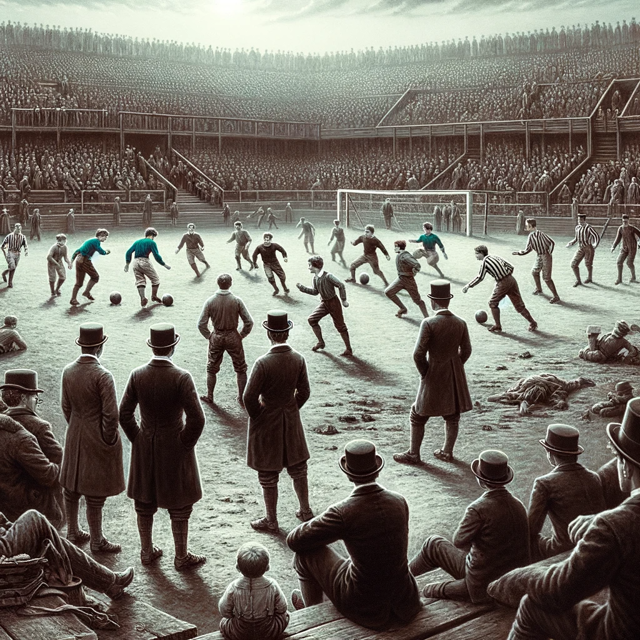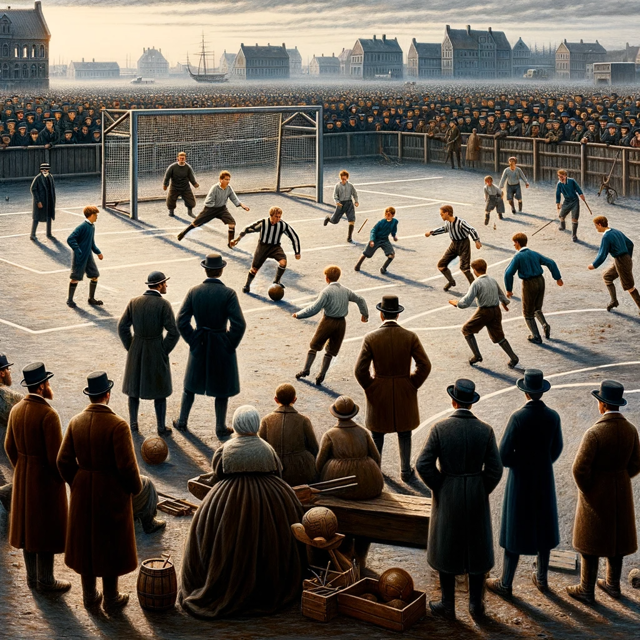January 2024
Living on the Fringe delves into the rich history and cultural impact of football in Germany, tracing its journey from the early days of the German Football Association's formation to its widespread popularity, and capturing the profound passion of characters like Wilhelm for the sport during a transformative period in European history. The novel weaves a captivating narrative that explores the evolution of football, reflecting its deep roots in society and its role in shaping communal identity and individual aspirations.
Last updated 20 months ago
Will publish on 06/07/2026
Living on the Fringe: Association Football
By Monica Granlove

In the novel The Surgeon and the Soldier Wilhelm, Ilse's brother, displayed a profound passion for playing football, or soccer, during a period when the sport was gaining popularity in Germany. The establishment of the German Football Association (Deutscher Fußball-Bund or DFB) in 1900 played a pivotal role in providing a centralized governing body for football in the country. By 1913, the DFB actively worked on standardizing rules and organizing national competitions, contributing to the sport's rise in popularity. Football's accessibility and simplicity became key factors in its widespread appeal.
The history of football, or soccer, is a rich tapestry that spans centuries. Ancient civilizations, including the Greeks and Romans, engaged in various ball games involving kicking, though these early forms lacked standardized rules. The 19th century witnessed the establishment of rules that shaped the modern game, with the Cambridge Rules of 1848 influencing key elements like the use of hands for goalkeepers and the prohibition of carrying the ball. The creation of the Football Association (FA) in England in 1863 was a pivotal moment, leading to the standardization of rules and the widespread adoption of the FA's Laws of the Game.
Football rapidly transcended English borders, spreading to other parts of Europe and South America. Leagues and clubs formed, and international competitions, including the first match between England and Scotland in 1872, marked the beginning of football's global presence.

The 20th century witnessed the professionalization of football, with players receiving wages. The sport continued to expand globally, with the establishment of continental competitions and inclusion in the Olympic Games. Post-World War II, football experienced a surge in popularity, leading to the creation of European club competitions like the UEFA Champions League. Innovations in tactics, technology, and media coverage further shaped the sport's evolution.
Women's football gained prominence in the 20th century with organized competitions and the establishment of women's national teams. The inaugural FIFA Women's World Cup took place in 1991.
The term "soccer" emerged as a colloquial or slang term in England during the late 19th and early 20th centuries to distinguish "association football" from other football codes. The word "soccer" derived from adding the "-er" suffix to "association," forming "assoccer" and eventually shortening to "soccer." While its usage declined in England, it persisted in other countries, notably the United States and Canada, where different forms of football were more popular.

Although American football is the most popular sport in the United States, soccer is the most popular globally. Advances in technology and media have made soccer more accessible than ever. Live broadcasts, streaming services, and extensive coverage on television and digital platforms ensure that fans can follow their favorite teams and players closely. The emergence of iconic players like Lionel Messi, Cristiano Ronaldo, Neymar, and others adds star power to the sport. Fans often develop strong connections with these players, enhancing their passion for the game.
In many countries, soccer holds cultural significance and plays a role in national identity. Major tournaments often become cultural events, bringing people together in celebration and competition. Let’s look at the countries that are widely recognized for having exceptionally large and passionate soccer fanbases.
- Brazil: Renowned for its passionate soccer culture, Brazil holds soccer in high regard, producing some of the greatest players in the sport's history. The national team's success has contributed to an incredibly dedicated fanbase.
- Argentina: With a long and storied soccer history, Argentina boasts a fanatical fanbase that supports both local clubs and the national team. Intense rivalries between clubs like Boca Juniors and River Plate contribute to the fervor of Argentine soccer.
- Germany: Soccer is deeply embedded in German culture, with a strong tradition of supporting local Bundesliga clubs and the national team. Germany has consistently high attendance at matches and a robust soccer infrastructure.
- England: Home to one of the oldest and most passionate soccer leagues, the English Premier League, England has a rich soccer history. The fervent support for clubs and the national team is evident in the passionate fanbase.
- Italy: With a rich soccer tradition, Italy has a passionate fanbase supporting Serie A clubs like Juventus, AC Milan, and Inter Milan. The Italian national team's success in international tournaments has also contributed to the country's soccer fervor.
- Spain: Boasting a vibrant soccer culture, Spain has clubs like FC Barcelona and Real Madrid with large and dedicated fanbases. The national team's success in international competitions has further heightened soccer's popularity.
During the 2022 World Cup, held in Qatar, Barcelona turned into a hub of excitement. Sponsored by Qatar, the world watched the events on television or listened to the radio. Bars, hotels, and restaurants in Barcelona had their televisions tuned to the games, with people pouring into the streets to get closer to the action. After each game, the winning country often had cars with flags driving through the downtown area, creating a lively atmosphere of laughter, cheering
I cherish the nostalgic recollections of my time playing for a team known as the Royals. Within the squad, I assumed the roles of either defensive fullback or goalkeeper, contributing to a wealth of fond memories on the field.


